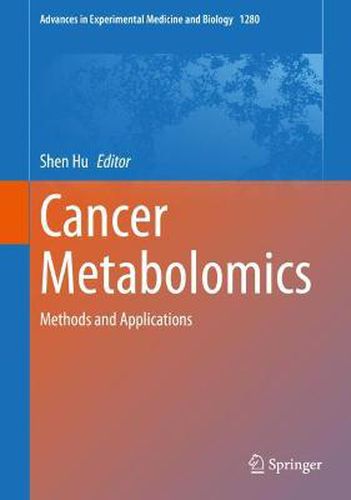Readings Newsletter
Become a Readings Member to make your shopping experience even easier.
Sign in or sign up for free!
You’re not far away from qualifying for FREE standard shipping within Australia
You’ve qualified for FREE standard shipping within Australia
The cart is loading…






This title is printed to order. This book may have been self-published. If so, we cannot guarantee the quality of the content. In the main most books will have gone through the editing process however some may not. We therefore suggest that you be aware of this before ordering this book. If in doubt check either the author or publisher’s details as we are unable to accept any returns unless they are faulty. Please contact us if you have any questions.
Cancer metabolomics is a rapidly evolving field that aims for a comprehensive dissection of the metabolic phenotypes and functional network of metabolites in human cancers. State of the art metabolomics tools have been developed and applied to studying cancer metabolism and developing metabolic targets for improved diagnosis, prognosis and therapeutic treatment of human cancers. Chapters are written by subject experts in the field of cancer metabolomics with cross-disciplinary contributions. Coverage includes advanced metabolomics technologies and methodologies, including chemical isotope labelling liquid chromatography - mass spectrometry, capillary ion chromatography - mass spectrometry, 2-D gas chromatography - mass spectrometry, capillary electrophoresis - mass spectrometry, nuclear magnetic resonance spectroscopy, shotgun lipidomics, tracer-based metabolomics, microbial metabolomics, mass spectrometry imaging for single cell metabolomics and functional metabolomics. In addition, the book highlights new discoveries in cancer metabolism such as hypoxia inducible factor pathway, isocitrate dehydrogenase 1 mutation and oncometabolites. Finally, contributors focus on the translational applications of metabolomics in human cancers such as glioma, head and neck cancer, and gastric cancer. This new volume will be a unique reference source for cancer researchers and promote applications of metabolomics in understanding cancer metabolism.
$9.00 standard shipping within Australia
FREE standard shipping within Australia for orders over $100.00
Express & International shipping calculated at checkout
This title is printed to order. This book may have been self-published. If so, we cannot guarantee the quality of the content. In the main most books will have gone through the editing process however some may not. We therefore suggest that you be aware of this before ordering this book. If in doubt check either the author or publisher’s details as we are unable to accept any returns unless they are faulty. Please contact us if you have any questions.
Cancer metabolomics is a rapidly evolving field that aims for a comprehensive dissection of the metabolic phenotypes and functional network of metabolites in human cancers. State of the art metabolomics tools have been developed and applied to studying cancer metabolism and developing metabolic targets for improved diagnosis, prognosis and therapeutic treatment of human cancers. Chapters are written by subject experts in the field of cancer metabolomics with cross-disciplinary contributions. Coverage includes advanced metabolomics technologies and methodologies, including chemical isotope labelling liquid chromatography - mass spectrometry, capillary ion chromatography - mass spectrometry, 2-D gas chromatography - mass spectrometry, capillary electrophoresis - mass spectrometry, nuclear magnetic resonance spectroscopy, shotgun lipidomics, tracer-based metabolomics, microbial metabolomics, mass spectrometry imaging for single cell metabolomics and functional metabolomics. In addition, the book highlights new discoveries in cancer metabolism such as hypoxia inducible factor pathway, isocitrate dehydrogenase 1 mutation and oncometabolites. Finally, contributors focus on the translational applications of metabolomics in human cancers such as glioma, head and neck cancer, and gastric cancer. This new volume will be a unique reference source for cancer researchers and promote applications of metabolomics in understanding cancer metabolism.